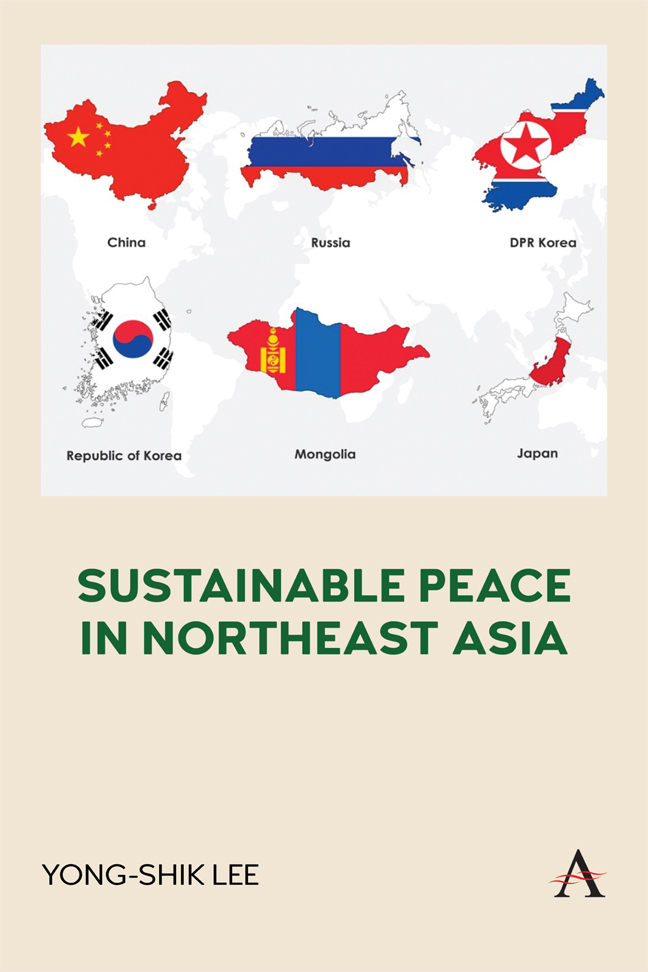Book contents
- Frontmatter
- Dedication
- Advanced Reviews
- About the Author
- Contents
- Figures
- Tables
- List of Abbreviations
- Foreword
- Preface
- Acknowledgments
- 1 Introduction
- 2 The Heritage from the Cold War—North Korea and the Nuclear Crisis
- 3 The New Asian Paradigm or Return to the Old Asia—Rise of China and its Role in the Region
- 4 A New Balancer in the Region? South Korea at the Crossroads
- 5 A Power With Rising Concerns: Escalation of Tensions Between Japan and its Neighbors
- 6 Insiders from the Outside: The United States and Russia
- 7 A Hidden Player: Mongolia and its Role in the Power Dynamics of Northeast Asia
- 8 Pathway to Peace and Stability in Northeast Asia
- Notes
- Bibliography
- Index
7 - A Hidden Player: Mongolia and its Role in the Power Dynamics of Northeast Asia
Published online by Cambridge University Press: 29 February 2024
- Frontmatter
- Dedication
- Advanced Reviews
- About the Author
- Contents
- Figures
- Tables
- List of Abbreviations
- Foreword
- Preface
- Acknowledgments
- 1 Introduction
- 2 The Heritage from the Cold War—North Korea and the Nuclear Crisis
- 3 The New Asian Paradigm or Return to the Old Asia—Rise of China and its Role in the Region
- 4 A New Balancer in the Region? South Korea at the Crossroads
- 5 A Power With Rising Concerns: Escalation of Tensions Between Japan and its Neighbors
- 6 Insiders from the Outside: The United States and Russia
- 7 A Hidden Player: Mongolia and its Role in the Power Dynamics of Northeast Asia
- 8 Pathway to Peace and Stability in Northeast Asia
- Notes
- Bibliography
- Index
Summary
7.1 An Independent Mongolia: Historical Context—From World Domination to the Fight for Independence
7.1.1 Pax Mongolica
Mongolia, the country that once dominated the world in the thirteenth and fourteenth centuries, is now the smallest power in Northeast Asia in terms of population (3.29 million) and economy (US$ 15.1 billion GDP as of 2021). However, despite their modest presence in the present day, the Mongols, through their conquest and expansion throughout the thirteenth century, left a profound political, economic, and cultural impact on the Asian and European continents and changed the course of all nations therein. At its height, the Mongol Empire formed the largest land empire in history, spanning from the Pacific Ocean in the east to the Danube River in the west, as illustrated in Figure 7.1.
The Mongols’ military success was unprecedented. The Mongols possessed an impressive cavalry, which could travel up to 100 miles (160 kilometers) a day and move without heavy supplies—unlike other armies at the time. The military genius of Mongolian leaders and generals (such as Chinggis Khan and General Subutai), supported by such powerful cavalry forces, led to unparalleled conquest within a few decades. The Mongol conquest was brutal and destructive, destroying the world's then greatest cities such as Herat, Kyiv, and Baghdad and claiming many lives therein. However, once the Mongol Empire had substantially completed its conquests by the mid-thirteenth century, it brought political unity and stability to the world, including Northeast Asia, often described as the “Pax Mongolica.” The Mongols set up an extensive postal relay system (“jam” system) throughout their empire, which was comprised of fixed relay stations that provided official travelers with horses, lodging, and other necessities for their journeys. The jam system expanded and became the most extensive network of communication and transportation in the pre-modern era, which facilitated the exchange of people, goods, information, and cultures between the East and the West.
The Mongol domination continued for over a century but ended with the dissolution of the Mongol Empire in 1368. The empire had been split into four Khanates (territories ruled by Mongolian leaders, “Khans”): the Golden Hordes in the Northwest (present-day Russia), the Yuan Dynasty in China, the Ilkhanate in the Southwest and Persia, and the Chagatai Khanate in Central Asia. These Khanates retained a strong sense of shared identity and ruled under the laws and traditions of Chinggis Khan, but they operated as autonomous states.
- Type
- Chapter
- Information
- Sustainable Peace in Northeast Asia , pp. 141 - 160Publisher: Anthem PressPrint publication year: 2023



